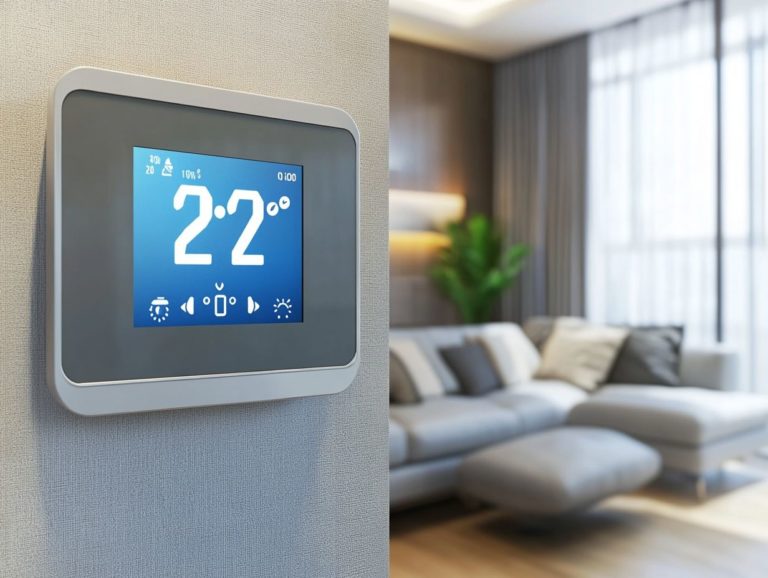What is the Future of Home Energy Solutions?
As the world places a greater emphasis on sustainability, you are presented with a variety of innovative energy solutions aimed at reducing consumption and lowering your utility bills.
This article delves into the current landscape of home energy options, including traditional systems and the latest cutting-edge technologies. It discusses the benefits and drawbacks of various solutions, examines emerging trends, and underscores the pivotal role of renewable energy.
You ll find practical tips tailored for homeowners eager to embrace sustainable practices that can truly make a difference.
Contents
- Key Takeaways:
- The Current State of Home Energy Solutions
- Future Trends in Home Energy Solutions
- The Role of Renewable Energy in Home Solutions
- How Homeowners Can Adopt Sustainable Energy Practices
- Frequently Asked Questions
- What is the future of home energy solutions?
- What are some examples of home energy solutions?
- How can home energy solutions benefit homeowners?
- What are the challenges facing the implementation of home energy solutions?
- How can I make my home more energy-efficient?
- What role do governments play in promoting home energy solutions?
Key Takeaways:
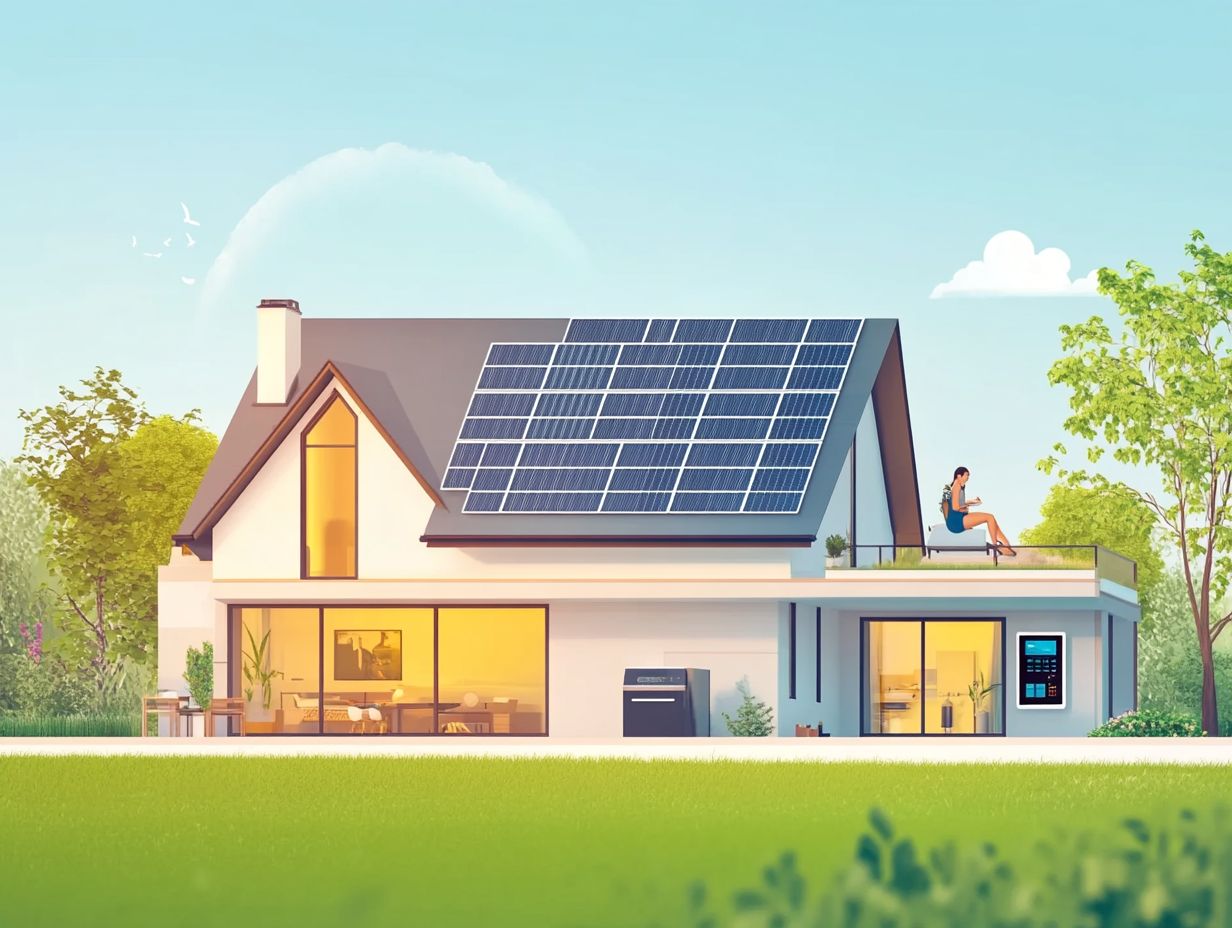
Home energy solutions are constantly evolving, with advancements in technology and increased focus on renewable energy sources. You can reduce energy consumption by making simple changes to your daily habits and investing in long-term sustainable solutions. The future of home energy solutions will rely heavily on renewable energy sources, which offer numerous benefits but also present challenges in terms of implementation and infrastructure.
The Current State of Home Energy Solutions
The current landscape of home energy solutions showcases a remarkable shift toward smart home innovations and energy management systems that emphasize efficiency and sustainability. With the rise of connected devices and sophisticated energy tracking solutions, you now have the power to manage your energy consumption more effectively than ever before.
Products like the DELTA Pro Ultra and EcoFlow are transforming energy management and allow for seamless integration with devices such as Bosch heat pumps and home energy storage systems.
In this evolving ecosystem, renewable energy sources are pivotal, significantly boosting your potential for energy independence and sustainability.
Types of Home Energy Solutions Available
- Advanced energy management systems that carefully track your energy usage.
- Connected devices like smart thermostats and motion sensors that automate your energy savings.
- Smart appliances from renowned brands such as Samsung and LG, which minimize energy waste.
- Home energy storage systems like the Tesla Powerwall, enabling you to store energy generated from renewable sources.
Advantages and Limitations
Understanding the advantages and limitations of energy management solutions is crucial for you as a homeowner aiming to optimize your energy consumption effectively. These solutions promise substantial cost savings by lowering your utility bills and enhancing energy efficiency, which means using less energy to provide the same service.
By leveraging smart home technology, you can monitor and control your energy use in real-time, enabling you to make informed decisions that reduce waste. Be sure to consider the initial setup costs and be mindful of potential technological hurdles, like compatibility issues with your existing systems or non-user-friendly interfaces.
However, considering the rapid advancements in energy management innovations, you’ll often find that the benefits far outweigh these challenges.
Future Trends in Home Energy Solutions
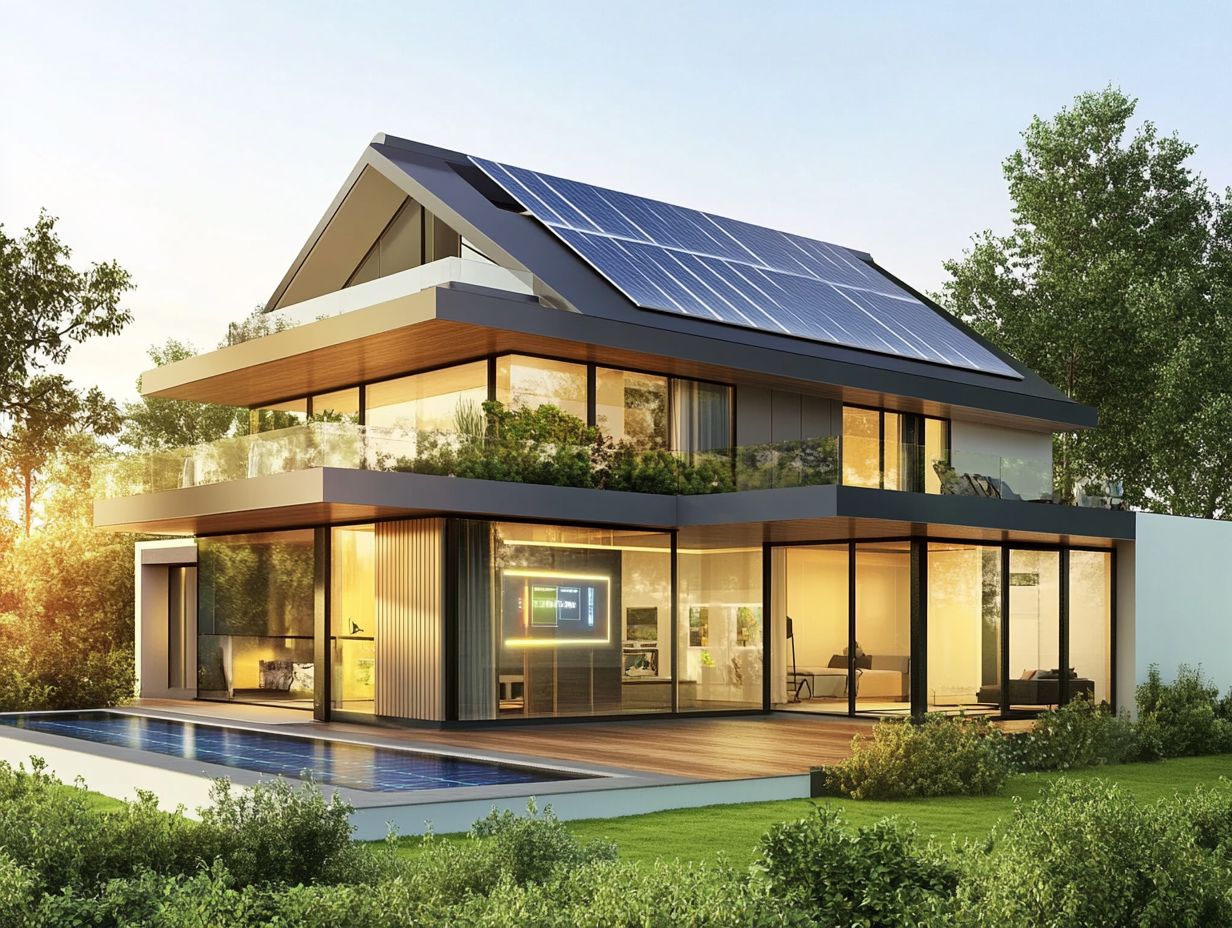
Future trends in home energy solutions suggest that you’ll increasingly rely on technology and innovation, particularly with a pronounced focus on AI in energy management and the integration of smart panels to optimize performance. The advancements in home technology are setting the stage for more efficient energy tracking solutions that not only make monitoring effortless but also elevate user engagement and interaction.
Collaborative industry standards will be essential in ensuring that your devices work seamlessly together, ultimately crafting a more cohesive and efficient energy ecosystem. Now is the time to embrace these innovations for a sustainable future!
Technological Advancements
Technological advancements are transforming the realm of home energy solutions, especially with the integration of AI in energy management and smart panels.
These innovations optimize energy consumption and elevate your experience by delivering real-time data and insights. AI algorithms analyze your usage patterns, enabling you to make informed decisions that cut down on waste and reduce costs.
Smart panels play a crucial role in seamlessly incorporating renewable energy sources, like solar power, giving you enhanced control and efficiency. With advanced energy tracking technologies at your fingertips, you can monitor your energy usage more effectively, pinpointing areas where you can save and maximize efficiency.
As a result, your home becomes not only more energy-efficient but also environmentally friendly and economically viable, marking a significant shift toward sustainable living.
Impact on Energy Consumption
The impact of emerging technologies on energy consumption is truly transformative, as energy tracking solutions and smart appliances allow you to make informed decisions.
These innovations deepen your understanding of energy usage patterns and play a significant role in reducing overall consumption. With real-time data at your fingertips, energy tracking solutions help you identify wasteful habits and take corrective actions.
Meanwhile, products like energy-independent heat pumps enhance the efficiency of your heating and cooling systems. This means lower utility bills for you while also supporting broader sustainability efforts by minimizing your carbon footprint.
As you become more aware and proactive, the overall impact of these technologies encourages a more responsible and mindful approach to your energy consumption.
The Role of Renewable Energy in Home Solutions
Renewable energy is essential for revolutionizing home energy solutions, providing you with sustainable alternatives to conventional energy sources.
Embracing these options not only enhances your energy efficiency but also contributes to a greener future.
Benefits and Challenges
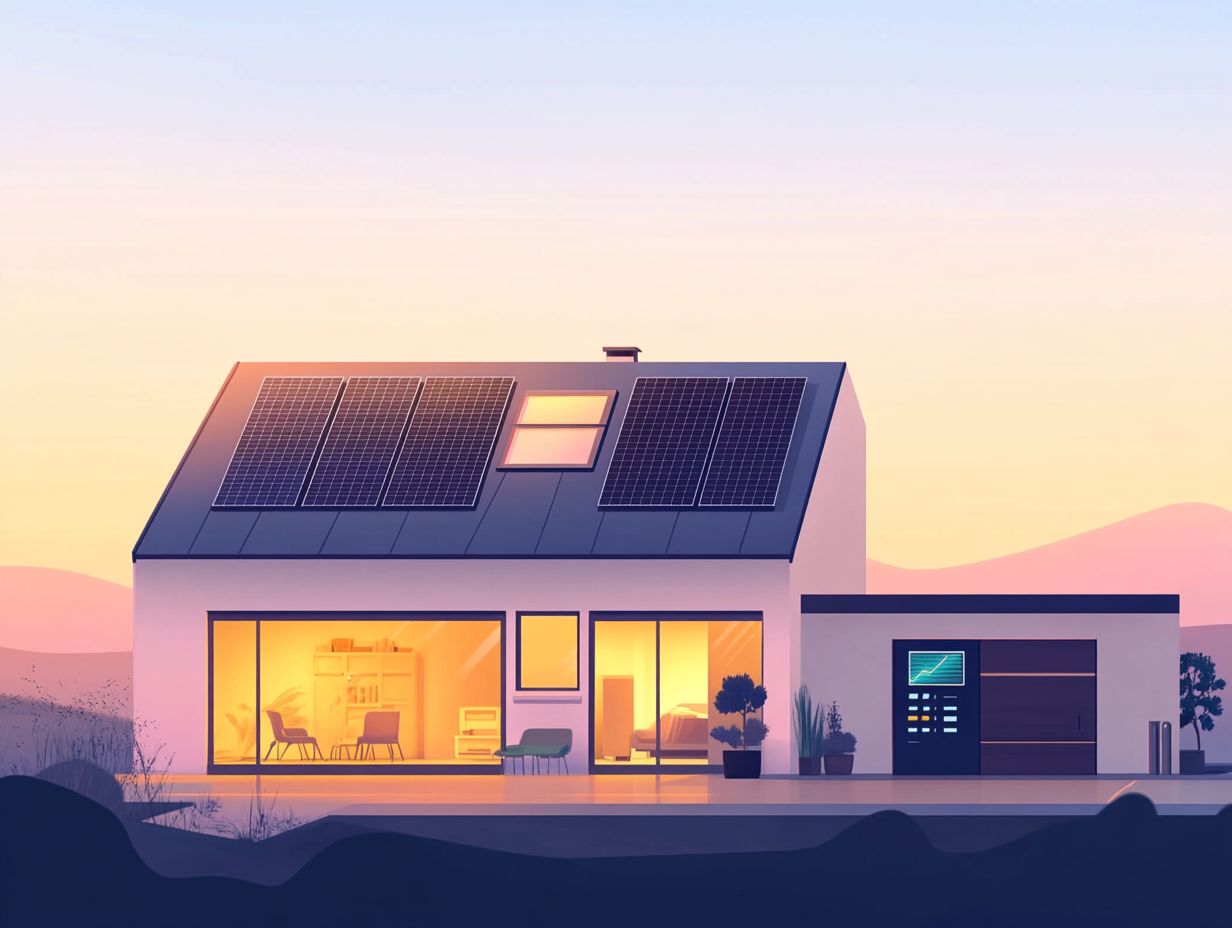
The adoption of renewable energy sources presents an array of benefits and challenges for you as a homeowner navigating this transition.
Among the most notable advantages are significant cost savings over time and a positive impact on the environment. By investing in technologies like Bosch heat pumps, you can dramatically reduce your reliance on fossil fuels, leading to lower utility bills and a minimized carbon footprint.
Remember, while initial investments can feel daunting, the long-term savings are worth it! Embracing new technologies could involve a learning curve, making it essential for you to stay informed and connected to experts in the field.
Balancing these benefits and challenges is crucial for making well-informed decisions.
How Homeowners Can Adopt Sustainable Energy Practices
Now is the time for homeowners to seize the opportunity and embrace sustainable energy practices by implementing a blend of straightforward adjustments and long-term strategies.
These changes not only enhance energy efficiency but also significantly reduce overall consumption.
Simple Changes to Reduce Energy Consumption
Implementing simple changes can dramatically reduce your home s energy consumption, positively impacting both the environment and your energy bills.
By swapping out traditional appliances for energy-efficient models, you can lower your power usage without compromising on performance. Similarly, incorporating smart home technologies like programmable thermostats and automated lighting systems allows you to take control of your energy use, enhancing overall efficiency.
Utilizing energy tracking solutions puts the power in your hands, enabling you to monitor your consumption patterns and gain insights that encourage mindful usage and additional savings.
These technological advancements not only champion sustainability but also foster a more comfortable living environment, seamlessly integrating energy conservation into your daily life.
Investing in Long-Term Solutions
Investing in long-term solutions is key for you as a homeowner if you aim for energy independence and foster sustainability in your energy consumption practices.
By choosing durable energy-saving options and efficient home energy storage systems, you can break free from traditional power grids and enjoy true energy independence! Not only do these systems help lower your monthly energy bills, but they also provide a safety net during high-demand periods or outages.
As your efficiency improves, you ll notice how this can enhance your home s value, offering a favorable return on investment over time.
With the increasing emphasis on reducing carbon footprints, integrating advanced technologies in energy management allows you to make smarter decisions that benefit both the environment and your financial health.
Frequently Asked Questions
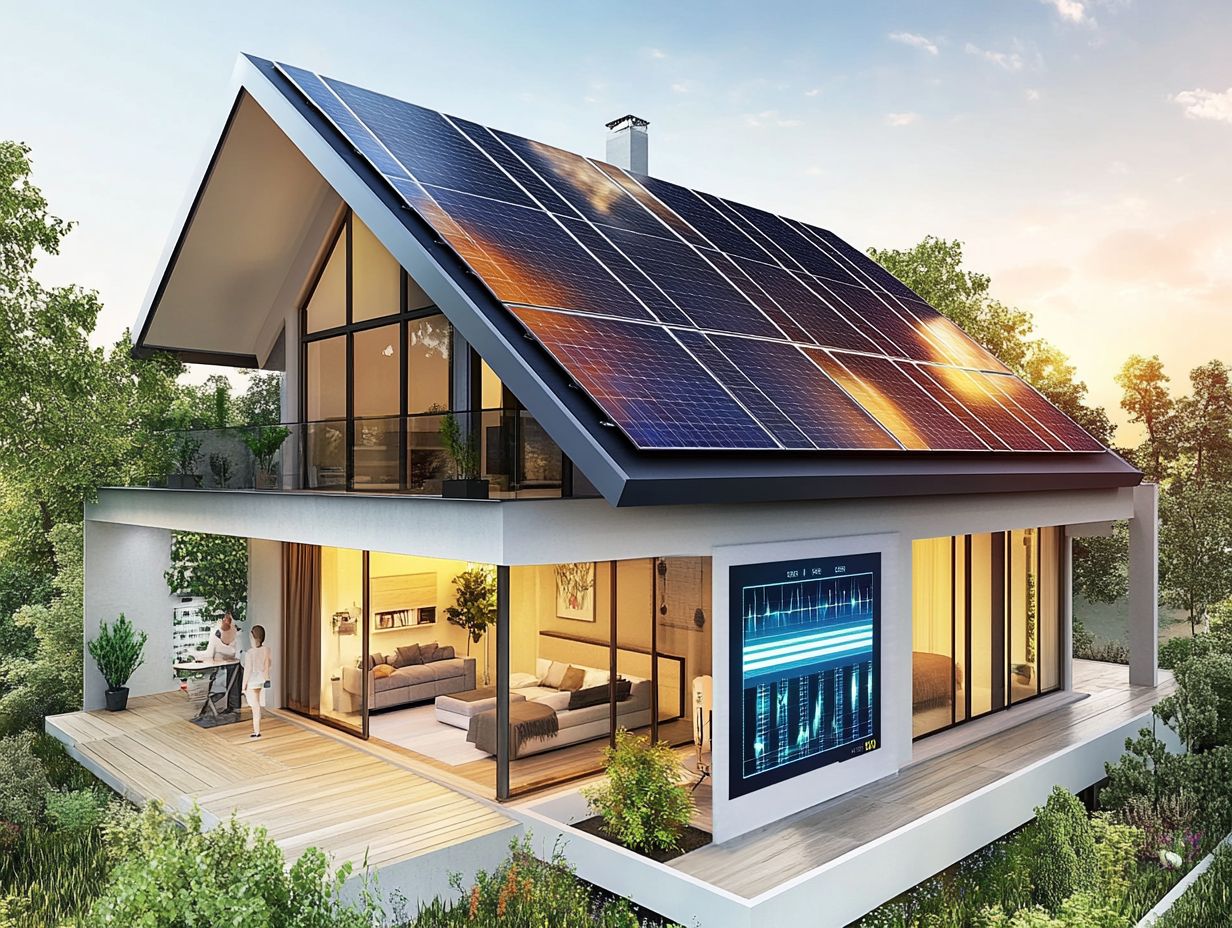
What is the future of home energy solutions?
The future of home energy solutions focuses on sustainable and renewable energy sources, like solar power and wind energy. It also involves using smart technology and energy-efficient appliances, such as refrigerators or washing machines that use less electricity, to reduce energy consumption and costs.
What are some examples of home energy solutions?
Examples of home energy solutions include solar panels, energy-efficient appliances, smart thermostats, LED light bulbs, and home battery storage systems. These solutions help reduce energy consumption, save money, and decrease the carbon footprint of households.
How can home energy solutions benefit homeowners?
Home energy solutions can benefit homeowners in several ways. They save money on energy bills, increase property value, and provide a reliable energy source during outages. Some governments offer incentives or tax credits for using renewable energy sources, making it a financially beneficial option for homeowners.
What are the challenges facing the implementation of home energy solutions?
One of the main challenges is the initial cost. Many homeowners may lack the financial resources to invest in renewable energy sources or energy-efficient appliances. The technology is still relatively new and may require specialized installation and maintenance, making it difficult for some households to adopt.
How can I make my home more energy-efficient?
There are many ways to make your home more energy-efficient. Simple steps include using LED light bulbs, turning off electronics when not in use, and properly insulating your home. More advanced solutions involve installing solar panels or a smart thermostat to regulate energy usage. Conducting an energy audit can also help identify areas for improvement.
What role do governments play in promoting home energy solutions?
Governments play a crucial role by providing incentives and tax credits to encourage homeowners to adopt renewable energy sources. They set energy efficiency standards for household appliances and buildings, ensuring new constructions meet certain requirements. Additionally, governments can fund research and development for improved home energy solutions.
Start your journey to energy independence today! Explore options for solar panels or energy-efficient appliances.


